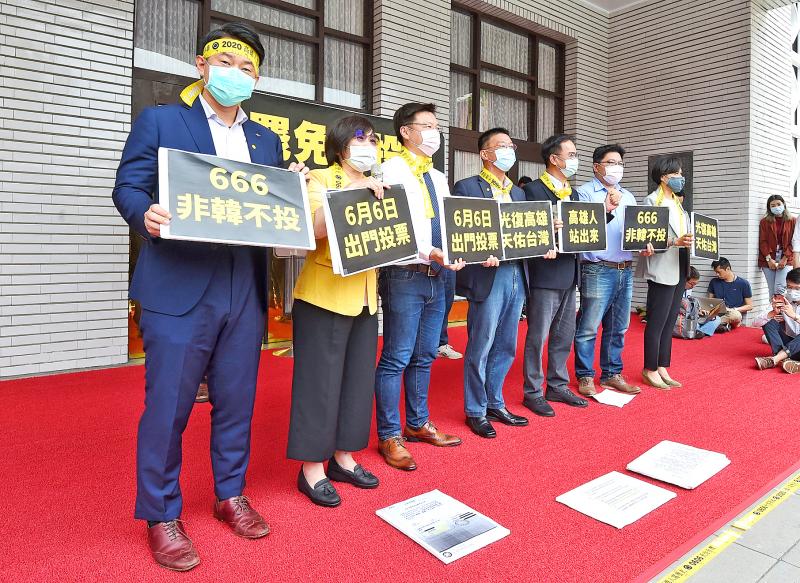Lawmakers from the pan-green camp yesterday accused the Kaohsiung City Government of trying to obstruct efforts to set up polling stations for a vote to recall Kaohsiung Mayor Han Kuo-yu (韓國瑜) as well as related promotional campaigns.
The Central Election Commission (CEC) on April 17 announced that the recall vote would take place on June 6.
As of Monday, the Kaohsiung City Election Commission, the CEC’s branch in the city, had secured only 1,313 locations for polling stations, leaving it 510 polling booths short of its planned total.

Photo: Liu Hsin-de, Taipei Times
Democratic Progressive Party (DPP) Legislator Liu Shih-fang (劉世芳) told a news conference that efforts by Han and his team to prevent the recall vote hinders people’s ability to exercise their constitutional right.
All schools should lend the branch space for only two polling stations, the Kaohsiung Education Bureau has said, citing COVID-19 prevention efforts.
The Kaohsiung Civil Affairs Bureau has notified district offices that space allotted for polling stations should give priority to governmental organizations, Liu said.
Liu accused the Kaohsiung City Government of selectively enforcing laws, adding that promotional materials for the recall campaign were quickly taken down, while billboards praising Han remained in place.
The Kaohsiung Transportation Bureau has allegedly been pressuring advertising companies not to place advertisements for the recall campaign on public buses, while advertisements praising Han for being a mayor with integrity are still in place, Liu added.
The Kaohsiung Police Department’s notice that recall campaign events involving more than three people can only be held after obtaining the department’s approval was a regression of democracy and something that could only occur during the Martial Law era, she added.
DPP Legislator Lee Kun-tse (李昆澤) said all Kaohsiung residents have the right to vote on June 6 and called on Han not to suppress the basic rights of voters, adding that further oppression would only lead to a greater reprisal from city residents.
DPP Legislator Chao Tien-lin (趙天麟) said that the CEC branch has been unable to find venues to establish polling stations in Fongshan (鳳山), Lingya (苓雅) and Sanmin (三民) districts — represented by himself, DPP Legislator Hsu Chih-chieh (許智傑) and Lee respectively.
“It is simply intolerable,” Chao said, urging Kaohsiung residents to cast their ballots on June 6.
New Power Party (NPP) Legislator Chiu Hsien-chih (邱顯智) called on the CEC and the National Police Administration to contest the Kaohsiung Police Department’s notice, saying that it infringes on people’s right to recall elected officials and undoes the efforts of those who fought to give power back to the people.
Taiwan People’s Party (TPP) caucus whip Lai Hsiang-ling (賴香伶) did not attend the news conference, despite having been invited, saying that the party has its own stance regarding the issue.
The TPP believes that Han should not circumvent the Kaohsiung City Council’s scrutiny, nor should the Kaohsiung City Government seek to obstruct the vote with its administrative power, Lai said.
However, the TPP is concerned the DPP’s and the CEC’s statements raise suspicions of manipulation or an outright violation of administrative neutrality, Lai said, urging the pan-green and pan-blue camps to exercise prudence to avoid undermining administrative neutrality.

Alain Robert, known as the "French Spider-Man," praised Alex Honnold as exceptionally well-prepared after the US climber completed a free solo ascent of Taipei 101 yesterday. Robert said Honnold's ascent of the 508m-tall skyscraper in just more than one-and-a-half hours without using safety ropes or equipment was a remarkable achievement. "This is my life," he said in an interview conducted in French, adding that he liked the feeling of being "on the edge of danger." The 63-year-old Frenchman climbed Taipei 101 using ropes in December 2004, taking about four hours to reach the top. On a one-to-10 scale of difficulty, Robert said Taipei 101

Nipah virus infection is to be officially listed as a category 5 notifiable infectious disease in Taiwan in March, while clinical treatment guidelines are being formulated, the Centers for Disease Control (CDC) said yesterday. With Nipah infections being reported in other countries and considering its relatively high fatality rate, the centers on Jan. 16 announced that it would be listed as a notifiable infectious disease to bolster the nation’s systematic early warning system and increase public awareness, the CDC said. Bangladesh reported four fatal cases last year in separate districts, with three linked to raw date palm sap consumption, CDC Epidemic Intelligence

Taiwanese and US defense groups are collaborating to introduce deployable, semi-autonomous manufacturing systems for drones and components in a boost to the nation’s supply chain resilience. Taiwan’s G-Tech Optroelectronics Corp subsidiary GTOC and the US’ Aerkomm Inc on Friday announced an agreement with fellow US-based Firestorm Lab to adopt the latter’s xCell, a technology featuring 3D printers fitted in 6.1m container units. The systems enable aerial platforms and parts to be produced in high volumes from dispersed nodes capable of rapid redeployment, to minimize the risk of enemy strikes and to meet field requirements, they said. Firestorm chief technology officer Ian Muceus said

MORE FALL: An investigation into one of Xi’s key cronies, part of a broader ‘anti-corruption’ drive, indicates that he might have a deep distrust in the military, an expert said China’s latest military purge underscores systemic risks in its shift from collective leadership to sole rule under Chinese President Xi Jinping (習近平), and could disrupt its chain of command and military capabilities, a national security official said yesterday. If decisionmaking within the Chinese Communist Party has become “irrational” under one-man rule, the Taiwan Strait and the regional situation must be approached with extreme caution, given unforeseen risks, they added. The anonymous official made the remarks as China’s Central Military Commission Vice Chairman Zhang Youxia (張又俠) and Joint Staff Department Chief of Staff Liu Zhenli (劉振立) were reportedly being investigated for suspected “serious